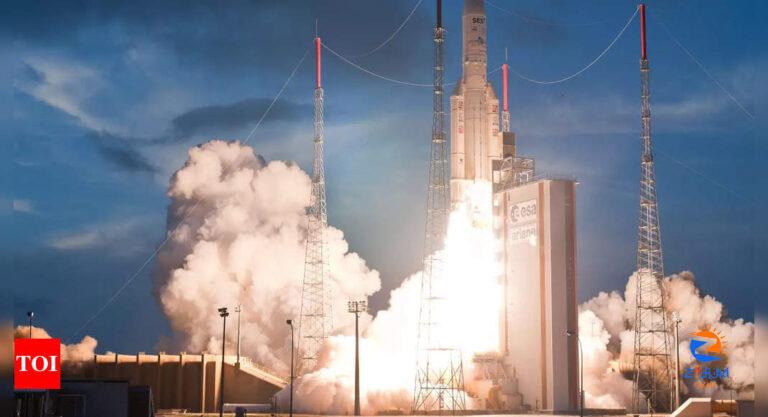
[ad_1]
NEW DELHI: Isro’s new commercial arm NewSpace India Ltd (NSIL) has announced its first “demand-driven” communication satellite mission, as part of the space reforms initiated by the government last year. Under the mission, the public sector undertaking (PSU) will get its first four-tonne Ku-band communication satellite Gsat-24 built by Isro and have it launched by Ariane-5 rocket, belonging to French company Arianespace. Thereafter, NSIL will lease the satellite capacity to Tata Sky.
As part of the reforms initiative, NSIL, which was set up in March 2019, has been given the mandate to undertake operational satellite missions on a “demand-driven” model, wherein the PSU has the responsibility to build, launch, own & operate a satellite and provide services to its committed customers.
Gsat-24 satellite, too, will be owned and operated by NSIL, which will fund the entire mission. “The entire satellite capacity on-board Gsat-24 will be leased to its committed customer M/s Tata Sky for meeting their DTH application needs,” NSIL said in a statement issued on Friday. NSIL is planning to launch Gsat-24 during the first quarter of 2022, it said. Recently, Isro chairman K Sivan said NSIL would acquire three communication satellites — Gsat-20, Gsat-22 and Gsat-24 — made by the space agency.
Earlier this year, NSIL had kicked off its first dedicated launch of PSLV-C51, which successfully lifted off Brazil’s Amazonia-1 satellite and 18 co-passenger satellites from Sriharikota on February 28. Amazonia-1 was the optical earth observation satellite of National Institute for Space Research (INPE) of the south American country.
Besides these projects, NSIL, led by CMD Durairaj Radhakrishnan, is also involved in contracting Isro’s yet-to-be-launched Satellite Launch Vehicle (SSLV or mini-PSLV) project and other rockets.
The Department of Space (DoS) plans to realise entirely-built rockets — PSLV, GSLV-Mk III and SSLV — from Indian industry partners. NSIL has recently received three bids from HAL-L&T, BEL-Adani-BEML and BHEL in response to the request for proposal floated by it for end-to-end production of PSLV and is currently going through the techno-commercial evaluation of the bids.
As part of the reforms initiative, NSIL, which was set up in March 2019, has been given the mandate to undertake operational satellite missions on a “demand-driven” model, wherein the PSU has the responsibility to build, launch, own & operate a satellite and provide services to its committed customers.
Gsat-24 satellite, too, will be owned and operated by NSIL, which will fund the entire mission. “The entire satellite capacity on-board Gsat-24 will be leased to its committed customer M/s Tata Sky for meeting their DTH application needs,” NSIL said in a statement issued on Friday. NSIL is planning to launch Gsat-24 during the first quarter of 2022, it said. Recently, Isro chairman K Sivan said NSIL would acquire three communication satellites — Gsat-20, Gsat-22 and Gsat-24 — made by the space agency.
Earlier this year, NSIL had kicked off its first dedicated launch of PSLV-C51, which successfully lifted off Brazil’s Amazonia-1 satellite and 18 co-passenger satellites from Sriharikota on February 28. Amazonia-1 was the optical earth observation satellite of National Institute for Space Research (INPE) of the south American country.
Besides these projects, NSIL, led by CMD Durairaj Radhakrishnan, is also involved in contracting Isro’s yet-to-be-launched Satellite Launch Vehicle (SSLV or mini-PSLV) project and other rockets.
The Department of Space (DoS) plans to realise entirely-built rockets — PSLV, GSLV-Mk III and SSLV — from Indian industry partners. NSIL has recently received three bids from HAL-L&T, BEL-Adani-BEML and BHEL in response to the request for proposal floated by it for end-to-end production of PSLV and is currently going through the techno-commercial evaluation of the bids.
[ad_2]